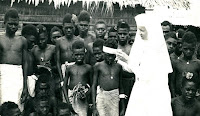I was
taught by sisters of St. Joseph of Carondelet, the first of the St.
Joseph nuns to come to the USA California
in 1912) , and in fact thought of joining them myself, to become a doctor
and be off to their missions in the Solomon Islands
Four sisters
of this California Solomon Islands Pearl
Harbor .
The
Japanese quickly occupied many of the islands in the South Pacific. The sisters
had been deeply involved in a village on the island of Buka
Sister
Hedda Jager was the one who recorded their daily lives in journals. No matter
what kind of day she was having, she always managed to record the day’s
happenings.
As the
Japanese got closer and closer, Sister Hedda recorded how these young religious changed from working as missionaries to being filled with "holy" terror. They made it to
Bougainville where they learned how
other missionaries in the Solomons had been tortured and executed.
There were
Marist missionary priests on the island and, knowing what the fate of the nuns
would be if captured, they managed to hide the sisters for months in the
jungle. On New Year’s Eve 1942, the priests managed to get the sisters and 25
others to the beach in Teop
Harbor
On New
Year’s Day 1943, in the early morning darkness, the submarine Nautilus pulled
to within 100 feet of the beach and the terrified passengers were safely taken
on board and brought to safety.
 Sister
Hedda wrote in her journal: “You cannot put into words the feeling that one has
for those of one’s own country, especially when one is miles from home and
running away from the Japanese.”
Sister
Hedda wrote in her journal: “You cannot put into words the feeling that one has
for those of one’s own country, especially when one is miles from home and
running away from the Japanese.”
When the
war ended the four Sisters returned to Buka to continue their work. The last of
them passed away in 1999. Lives given for their adopted people.
Sister
Hedda’s journals have been published in book-form under the title Trapped in Paradise .
 |
Included in the 300-page book are maps, photos, biographies of key individuals in the story, a glossary, and a book guide. “War Comes to Buka” by Father Joseph Lamarre, the sisters’ pastor, is also included. He provides his account of 30 months in a Japanese prison camp, describing what the sisters may have experienced had they not been rescued by submarine.


No comments:
Post a Comment